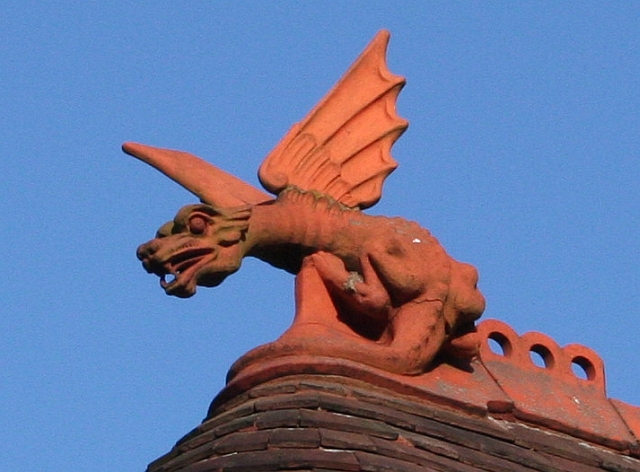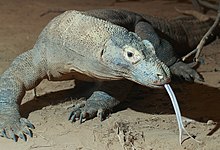Actually, I daren't even think about the reason for that.
Of the scaly dragons, there are several distinct species, which can be divided into those of the Western world and those of the East. Western dragons more often have wings than the eastern ones, but the eastern dragons are less likely to be bad-tempered. It's probably this that makes the eastern dragons much less likely to get killed by warriors. Unlike their western counterparts, eastern dragons are famous for being wise and for living a long time.
The most wonderful thing about eastern dragons, as far as The Word Den is concerned, is that according to legend it was they who taught humans to speak.
The Vietnamese subspecies of dragon is particularly important because the Vietnamese people are descended from a dragon and a fairy. Vietnamese dragons brings rain, too (whereas western dragons dislike the wet, which tends to put out their fires).
But where can you spot a dragon?
The island of Komodo has a huge lizard which called a dragon, though it isn't really one:
If you're not on Komodo, then the chances are your school or workplace has a human dragon bustling about being bossy and cross.
For the mermaids amongst us, there's always the chance of an Orange Weedy Sea Dragon:

But for those of us on firm ground, perhaps the best scaly dragon we can hope for is in a picture:
![St._George_and_the_Dragon John Ruskin [Public domain], via Wikimedia Commons](http://conniejjasperson.files.wordpress.com/2013/05/st-_george_and_the_dragon-john-ruskin-public-domain-via-wikimedia-commons.jpg?w=500&h=182)
or perhaps, if we're lucky, a dragon on a roof:

Bob Embleton Dragon Finial, The Gatehouse, Davenham
But still, never give up looking for a real live dragon.
You just never know.
Spot the frippet: dragon. This word comes from the Greek drakōn, dragon, huge serpent, or water-snake. The word is related to the Greek dracos, which means eye.

I have just learned more about dragons than I ever knew!
ReplyDeleteI've never really thought about the differences between the eastern and western ones. Silly me!
And where have I been the last fifty plus years that I missed out on the delightful orange weedy sea dragon! I feel deprived!
Great informative post again Sally! Ta!
Thanks very much, Jingles. There are many more sea dragons, all glorious and worth seeking out. And I must find out much more about the wisdom of the eastern dragons myself.
DeleteI am very fond of dragons and had a blue one embroidered on a silk dressing gown when I was about 8 and living in North Borneo. My very first published work was a story that won a competition in the local newspaper, the SABAH TIMES in 1953. It was called THE LEGEND OF KINABALU and was of course all about a fearsome dragon!
ReplyDeleteDo post it somewhere, Adele - perhaps on The History Girls. I'd love to read it.
Delete